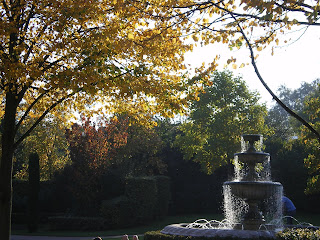 About 10-12 random Christians, those I know and don't know, come together for a dinner and discussion every Sunday evening. We each volunteer to share about something that we are passionate about that engages our faith. Below is part of introduction and conclusion of my lecture for tomorrow night covering the last 100yrs of Christian involvement with/reaction to culture. Part 2 will cover the current place of Christians in positions of power: politics, media, academia and business. Part 3 will discuss the role of the church and community in living out one's faith.
About 10-12 random Christians, those I know and don't know, come together for a dinner and discussion every Sunday evening. We each volunteer to share about something that we are passionate about that engages our faith. Below is part of introduction and conclusion of my lecture for tomorrow night covering the last 100yrs of Christian involvement with/reaction to culture. Part 2 will cover the current place of Christians in positions of power: politics, media, academia and business. Part 3 will discuss the role of the church and community in living out one's faith."Culture is what we make of the world, in both senses”-Ken Myers.
Culture is not the arts or the sense of being “cultured” or the “fish bowl” metaphor. It is how we see the world, similar to someone asking “what do you make of that book?” It is also making in the physical sense just like someone asking you “what are you making?” Defining culture in this way allows for greater depth, creativity and breadth.
God created all out of nothing, bringing order out of chaos. God is not only Creator but Ruler (which sounds bad to us Americans due to our history). God is also the first culture maker, he made a garden, he brought further order and beauty to what was already good. He made us to reflect His image and participate in that work, order accompanies creativity. He gave us a perception or a way to see the world. He modelled both senses of making culture. We are called to be priests, to be culture makers by uniting what has been broken by both receiving the world from God and offering it to God.
The world and what is in the world is not stagnant, it was not created to be that way and thus it is futile and dangerous to address culture in either sense as an abstract, ethereal concept. Adam's first task, and one that Eve was a helper in, was naming and cultivating creation. Culture is the activity of making meaning, otherwise Adam and Eve would have had a boring task, a boring life. Thankfully God is more creative and calls us to be. Seeing culture this way we realize the complexity of what occurs at the Fall. Besides the broken relationship with God, with paradise, with shalom, we now have a warped culture. To be culture makers we have enemies in our flesh, in our world and in Satan as we try to model God’s culture making.

Jesus is the ultimate and perfect priest. He does not throw out the old and bring in the new, he restores and redeems. Modeling his Father, he knows he is dealing with shattered ruins with glimpses of their former glory; mankind still bears some semblance of God’s image. Jesus identifies what is good and bad in our culture, in both senses, and his restoration heals and restores the good, bringing something new, fresh into existence (a new life, a healthy leg, a challenging principle “love your enemy”) while tearing down the bad bringing conflict, liberation, and freedom (turning the tables in the temple, casting out demons, conquering Satan and death, condemning “religion”, calling us brothers). Hebrews reminds how Jesus fulfilled all the expectations of being the perfect man, which included the roles of prophet, priest and king. He spent most of his life in the world behind the scenes before dramatically reshaping culture on every level. How did he engage with culture? How do we?
The patterns of the last century were to condemn, critique, copy or consume culture. Which of these did Jesus adopt? He did none of these and all of these for he adopted them as gestures not postures. A posture is your adopted, habitual stance to the world around you. It affects how you see and how you engage with the world. Bad postures inhibit movement and limit perspective. Good posture frees our movement and opens our perspective. Gestures are movements and actions adopted for specific occasions, circumstances and people. I can gesture rejection by a hand raised or a clenched fist, or pondering by a hand on my chin, mimicking by careful observation or greed by reaching out with both hands. There are all kinds of gestures we make to communicate what we think of something that is displayed in action. Gestures change whereas a posture does not, cannot. Jesus’ posture was one of creating, of making culture by healing what is broken and building up and bringing out the good that was held captive, hidden or maimed by the bad. Again what is good or bad is a result of what we make of the world in both senses of “make”-a physical artifact (slice of culture) and accepted perspective (belief of culture). Jesus doesn’t give us the option of making any gesture into a posture. Just looking at his life proves that he had no consistent gesture. What he does do is model perfectly how one interacts with culture in specific ways (the gestures). The only way to change culture is to create new culture; we need to offer an alternative. For our own joy and benefit (and others), and for God’s glory, we need to be better culture makers.
Preview of Part 2 and 3:
Are Christians in positions of cultural power? How do they view their faith and their work? Do they function independently or corporately? How do they interact with non-Christians? The earliest record of man, Genesis 1-2 reminds us that we need God, and were designed dependent on each other as human. It is interesting that the only longing present before the Fall is for community, the only thing God saw as “not good” was for man to be alone. (This normally is referenced in marriage but the more immediate reference should be friendship/community). For man to fully reflect God's image (trinity), community needed to be reflected as well. Life and culture is actually made more beautiful because of that dependency. There is development expected rather than an idealization of a garden paradise-the final vision given in the Bible is of a city with nations bringing forth their glory to be seen through the light of God's glory (Rev. 21:24) But how does sin impact all of this? What is the role of the church?
*if you want a link to the paper itself let me know




I would be interested in reading the whole thing :)
ReplyDelete